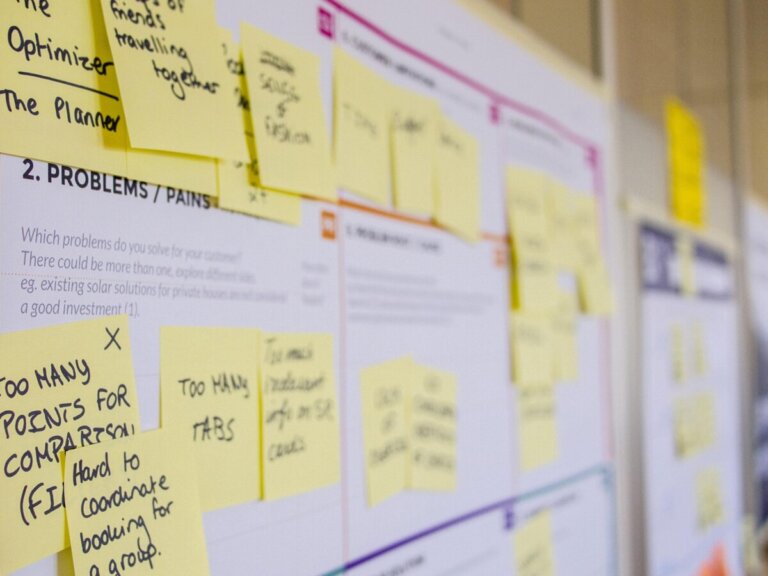
Author: Anna Schötz
· 6 mins read · 2,229 views
10 Agile Project Management Tools for 2021
Agile Tool Basics
What are Agile Project Management Tools?
Agile tools are project management tools that support an agile way of working, such as Scrum or Kanban. They help to manage agile projects more easily and to support teams that organize themselves in the agile model in their work in the best possible way. For internal agile projects, the Scrum Master is often responsible for the execution. He supports the team by helping to solve problems or providing resources. In external projects, this role is assumed by the customer or the product owner.
Why Should You Use Agile Project Management Tools?
Why do you need a tool at all? Teams and companies that want to save time and money and at the same time react flexible use the agile project management. Agile management is based primarily on flexibility. It is exactly at this point that classical management often has problems. Agile project management tools help to combine many functions of single tools like spreadsheets, whiteboards or old-school methods like index cards into one single tool and thus simplify the process.
- Agile teams can define their goals together and always track them
- With the use of agile project management tools, team members can collaborate and communicate to ensure that the process in the project is on track
- Teams don’t have to wait until the delivery phase to get feedback
- With the agile tools, the team can always keep control of every step in the project and make it visible
What Types of Agile Project Management Tools are Existing?
There are two types of agile project management tools:
- One is Scrum software, which is used to support a team working with Scrum.
- And Kanban tools, for prioritizing tasks and for optimal collaboration.
10 Top Agile Project Management Tool List
1. Jira
Probably the most widely used software for agile teams is Jira. It is designed for bug tracking, issue tracking and project management for software and mobile development processes.
It offers a high degree of customization. Some important features are capturing, assigning and prioritizing. In addition, you can customize the dashboard to fit your business processes. Offered are many options of Scrum project management tools such as Scrum or Kanban boards and various backlog functions. For visual reporting, Jira has burndown charts, velocity charts and more. It is also available on mobile devices and can be linked to numerous developer tools such as BitBucket or Confluence.
Jira is available from $10 per month for up to 10 users. There is also free licensing for non-profit organizations or educational institutions.
2. Monday.com
The Tool Monday provides a structure that can be easily adapted to the team. The tool is a great way for teams to focus on the work that needs to be done.
The tasks are written on a board and then the steps that need to be done are added. The tool offers several ways of displaying them and also warnings, assignments and much more. You can also customize the tasks. Another feature is that you can collect data from different boards. Also, you can communicate via the comment function or mentions. The tool thus focuses on easy and individual customization. Slack, Google Calendar, Jira, Trello, Dropbox and much more can be integrated.
The advantage of this tool is the focus on collaboration and the many integrations that are possible. The disadvantage is the difficult price category.
The cost of the tool starts at $17/month for two users.
3. Asana
Asana is a cloud-based project management and task tool. It can be used to plan, organize and track tasks. It has all the features that are important for agile teams. Such as boards and timelines. It offers simple project and sprint plans. Asana lets you track progress by providing real-time status updates, reports and more. Project plans, files and feedback encourage team collaboration. It also lets you set goals and priorities for tasks.
Pricing starts at €10.99 per month for annual use and one user.
4. Active collab
With agile collab, companies can determine what each user can see and access. It offers options for project planning, time tracking, cost tracking and discussion of important topics. With tracking and monitoring capabilities, you can focus on what really matters and optimize time estimates. All tasks, communications, team members and files can be collected in one place.
For small teams who want to manage projects with small collaborations, the price for 3 members starts at $9/month.
5. Zoho sprints
Zoho sprints offers a collaborative approach and is an agile project management tool. Teams that just started working agile can use the tool as well as by teams that are already experts in agile working. The backlog is intuitively designed and makes it easy to plan and prioritize work items. User stories, tasks and bugs are offered. A global view helps keep track of projects. Each project has a dashboard that gives the Scrum Master a good overview. It gives the team the ability to get live updates on the activities in the project and schedule sprint planning, reviews and retrospectives. Zoho sprints can also be linked to Jira and other applications.
Advantage is the easy scheduling of meetings for sprints, reviews etc. and the possibility to turn messages directly into tasks. However, disadvantage is that there are no Kanban boards available and does not integrate well with other Zoho apps.
The paid plan of Zoho sprints starts at $12/month for 12 users.
6. Ravetree
Ravetree is an Agile Work software for agile project management, resource planning, CRM and time and cost tracking. The tool was designed directly for the agile organization, so it is especially suitable for marketing & advertising, architecture, management consulting, legal, universities or government agencies. It offers the agile tools already in Ravetree, so no add-ons are needed. It is very intuitive to use, and information is easy to find.
Sprints can be planned, story points defined, user stories and epics created, files shared, burndown charts displayed and much more.
The cost of Ravetree is $29 per month and per user.
7. Pivotal Tracker
The tool is a simple tool for agile project management. It works well for Kanban projects because it helps manage projects, tracks velocity, and helps with forecasting for the future. And it is especially useful for managing multiple projects at once because priorities can be clearly set, and projects can be viewed side by side. It also provides many options for analysis, such as cycle time reports or burnup charts. Countless extensions can be added, such as GitHub, Slack or Zendesk.
The tool is free for up to 3 users, for more users pricing starts at $12.50/month.
8. Nutcache
With this tool projects can be planned, tracked and managed. It is possible to organize the board with Scrum project management. The tasks can be planned, tracked and visually displayed on a diagram. Also, priorities can be set, and individual workflows can be created. Also, many integrations can be added.
The price is $6/month and per user.
9. Binfire
This tool is easy to use and helps especially virtual teams to plan, monitor and coordinate projects. It offers to-do lists, online storage, whiteboards and various project management features. The tool thus offers an all-in-one solution for managing remote team communication. It also offers various performance tracking options, such as burndown charts.
Pricing for the tool starts at $6.50/month and per user.
10. Meistertask
With Meistertasks you get a beautifully designed and intuitive Kanban tool. You can customize your boards and also editorial plans, sales funnels and onboarding processes for the company. Teams can collaborate, communicate and track the time they need too. You can automate various processes with this tool, such as recurring tasks. Checklists can also be added, and tasks can be reassigned or moved to new areas. Meistertask also offers various options such as statistics to track performance. Also integrated is the MindMeister app, which provides mind mapping for brainstorming. However, you can also integrate other tools such as Microsoft Teams, Slack or GitHub.
The costs start at $8.25 per month and per user.
Summary of the Best Agile Tools
| Name | Features | Costs | Link |
| Jira | Agile project management | $7/ month | https://www.atlassian.com/de/software/jira |
| Monday.com | Scaling organizations | $17/ month for 2 users | https://monday.com/lang/de/ |
| Asana | Project management and submissions tool | 10,99 € / month | https://asana.com/de |
| Active collab | Project planning, time recording, cost tracking | $9 / month | https://activecollab.com |
| Zoho sprints | Collaborative approach | $12/month | https://www.zoho.com/de/sprints |
| Ravetree | Agile project management, resource planning, CRM and time and cost tracking | $ 29 / month | https://www.ravetree.com |
| Pivotaltracker | Management of products, diagnostics for the future | $12,50/ month | https://www.pivotaltracker.com |
| nutcache | Plan, track and manage projects | $6/ month | https://www.nutcache.com |
| Binfire | Planning, monitoring and coordination of projects with remote teams | $6,50/month | https://www.binfire.com |
| Meistertask | Well-designed and intuitive Kanban tool | $8,25/ month | https://www.meistertask.com/de |
Criteria for Choosing the Right Agile Tool
General criteria
Choosing the right tool is of great importance. Choose a tool that best supports your team and its approach.
- Tools Should Facilitate Collaboration
- Communication between team members should be made as easy as possible. They should be able to communicate and discuss with each other to finally come to a result. The tool should allow everyone to participate in conversations, whether marketers, software developers or stakeholders.
- Document Progress
- The tool should be able to document the progress of discussions in order to link individual tasks. It should also be possible to report on the project so that an overview of the project can be kept.
- Central Repository
- Ideally, the tool should be a place where everything can be filed and stored. This is better than having several tools, because important things can then be found more quickly, and the information is made more transparent for all team members.
- Analyze
- Analysis is an important part of any project. It should therefore be possible to track the processes in real time. It is also important that the time spent on individual tasks can be tracked. Because this way you know which tasks took longer or shorter and for what reason.
Current agile project management trends
What Does the Future Look Like?
- Inclusion of hybrid project management
- Hybrid project management is about combining the approaches of classic project management with those of agile project management. With the hybrid model, projects, tasks and people can be united in one place, which helps to work better together and make the right decisions.
- More focus on data analytics and numbers
- In project management, there is a lot of data. Project managers can use data insights to make data-informed decisions. In every area of project management, whether quality management or risk assessment, Big Data analytics are increasingly being used. You can use data to learn how to better allocate teams, size teams, or determine the skills needed to better manage projects.
- More remote work
- It is nothing new that remote work is becoming more and more important. But this also offers many advantages in project management. More flexibility and time for the employees and less project costs in general. This also offers the possibility to put together even more diverse teams.
- Find out more about remote work on our blog post how to make remote teams work!
Looking for Expert IT Solutions?
Subscribe to Our Newsletter for Exclusive Tips and Updates!
Stay ahead of tech challenges with expert insights delivered straight to your inbox. From solving network issues to enhancing cybersecurity and streamlining software integration, our newsletter offers practical advice and the latest IT trends. Sign up today and let us help you make technology work seamlessly for your business!


Share